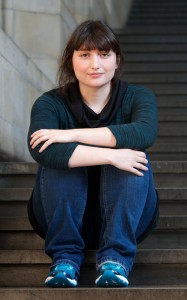 Rebecca Ingle is a second year PhD student in the Bristol Laser Group in the School of Chemistry. Her research involves studying photodissociation dynamics in both the gas and solution phase using a combination of laser experiments and computational chemistry methods.
Rebecca Ingle is a second year PhD student in the Bristol Laser Group in the School of Chemistry. Her research involves studying photodissociation dynamics in both the gas and solution phase using a combination of laser experiments and computational chemistry methods.
You often hear about how difficult PhDs can be, trying to juggle running your own experiments, analysing the data, thinking of fresh ideas and finding a way to squeeze a life in between it all. However, there is definitely one glamorous highlight to PhD life and that’s the numerous opportunities for travel, both in the UK and abroad.
Unfortunately, I’m not an environmental chemist and don’t have the excuse of needing to do fieldwork in remote, exotic locations. However, lasers are popular worldwide, and thanks to some help from the Bristol-Kyoto strategic fund, I was lucky enough to spend this summer working at Kyoto University.
To say I had no reservations about flying alone half way around the world to work on an unfamiliar experiment would be a lie. There were a few moments when I wondered if I had fully appreciated what I had signed up for and horrifying tales of Japan’s bounteous insect life in the summer months didn’t exactly help.
However, once I’d arrived in Kyoto, it didn’t take long at all for me to feel at home. Complaining about the weather is definitely a universal language and my Japanese hosts could regularly be heard proclaiming ‘atsui desune…’ (it’s hot, isn’t it?) in response to the insufferable 30 degree heat. Unlike the weather, I quickly acclimatised to a diet of udon, matcha bread and macadamia nut ice cream and the experiment turned out to have a lot more in common with my experiments at Bristol than I was expecting.
It ended up being an incredible few months and I learnt a huge amount about new experimental techniques. But how do you actually organise a research collaboration like this and what are some the advantages to getting away from your home lab?
Advantages of working away
One of the best parts about working away, be it for a research collaboration or conference, is it’s a bit like being away on a science holiday. You generally get fed and don’t have to worry about domestic drudgery, so you can spend all day focusing on your work. It’s hard not to be productive in this kind of environment, at least when the jetlag has passed.
Another huge advantage is having the chance for some fresh insight on your own work. Not only will you be exposed to new ideas and set-ups, but you’ll be asked questions about what you do from a completely different perspective. It’s often easy to be complacent and not think about why you use certain methods and techniques in your lab, simply because it’s the way it has always been done but it’s good to be forced to think about absolutely every aspect of your research.
If you’re going away for a conference, you’ll be inundated with novel work from a wide range of universities. It’s definitely an easier way of getting a feel for the latest developments in your field in a livelier, more interactive manner than trawling through the literature and may even be a good chance to start building some collaborative links with other research groups.
Depending on where you go, you might get to pick up some new language skills or even get to eat food that looks like this: 
How to make it happen
Travelling for conference or collaborations can be prohibitively expensive, even if you’re staying within the UK. However, particularly if you want to go abroad, there are numerous funding opportunities available though, be warned, you often need to look a long way in advance for them. If you are funded through one of the research councils, there is often a budget for your skills development and travel so that may be another avenue worth exploring.
If you think you’d like to escape your lab but have no idea where to go or who to work with, your supervisor can be a good starting point. Just emailing other academics, even if you’ve never met, with an explanation of why you’re interested in their work and what you can contribute can be a surprisingly successful method too.
I had a wonderful time in Japan and am hoping to go back again next year. Meanwhile, I’ve got a few conferences and events to keep me excited about both my own work and my field as a whole.

